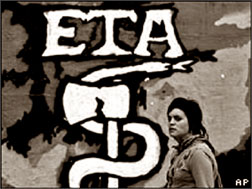End of Eta ceasefire no surprise
Eta's announcement ending its ceasefire comes as no surprise.
|

Eta is upset by the government's refusal to legalise Batasuna |
Eta and its body of supporters, including the illegal party Batasuna
and other radical Basque groups, have been growing increasingly
frustrated.
The armed separatists are upset by the government's refusal to
legalise Batasuna, the outlawed party regarded as Eta's political wing.
That upset increased during local elections in May when the Spanish
authorities banned over 100 lists of candidates in the Basque region
because of connections to Batasuna.
This all followed the government announcing the end of the Basque
peace process after Eta's bomb attack on Madrid's airport in December
that killed two people.
Although surveys suggest that about half of the people in the Basque
region want more autonomy and a significant number of that percentage
complete independence from Spain, Eta has only a very small number of
real supporters and, according to some experts perhaps 30 full-time
operatives.
One enduring difficulty that complicates the Basque issue is the
sympathy and justification that Batasuna and other radical left-wing
Basque groups give to Eta by explaining its murders, violence and
mafia-style extortion as a response to the government's repression of
Basque rights.
The vast majority of Spaniards find that attitude - in a democratic
Spain where the Basque region is one of the most independent regions in
Europe - irrational and repugnant.
|

The prime minister says Eta has made a mistake |
By expressing its anger, firstly through the bombing of Madrid's
airport and now through what amounts to a commitment to more violent
attacks, Eta has lost the best opportunity of engaging in dialogue with
a Spanish government that it has had for many years.
Prime Minister Jose Luis Rodriguez Zapatero says the militant,
separatist group has made another mistake. Only Eta supporters would
disagree with that analysis. When Eta announced its ceasefire last year
there was a sense of cautious optimism from politicians and Spaniards
that this really could have been the beginning of the end of the Basque
conflict.
But now, Spaniards are more cynical than ever about Eta's motives. It
is very unlikely that in the near future a Spanish government will be
prepared to engage Eta in a peace process. The prime minister says the
response to Eta's announcement will be the same that Spanish governments
have always given: a strong defence of democratic values and
institutions through the strict application of the law.
But Joaquin, an office worker in Madrid says the government needs to
recognise its mistakes, not just point to Eta's. "It's a difficult
problem for the government", he says, "but unfortunately it is now
obvious that Eta has got stronger."
Many Spaniards were against the government's failed peace process
from the start and others have become frustrated by what they see as
major errors by the government. For example, releasing the convicted Eta
killer Jose Ignacio de Juana Chaos from prison to stop him dying on
hunger strike.
They also feel that Eta has used the period of the ceasefire to
rearm. "I'm not surprised by this Eta announcement," says Alberto,
"because when you talk with people who are terrorists you can't expect
good things to come of it."
A point of view that brought tens of thousands of people onto the
streets in Madrid and other cities, to protest against the government's
policy of talking with Eta.
Spain is divided on how to deal with the conflict in the Basque
region. A majority of Spaniards supported the government's attempt to
bring peace through dialogue with Eta. A significant number are still in
favour. One big difficulty for the government is that the main
opposition, the conservative Popular Party, has refused to support it.
Rather than just a "complete absence of violence", one mantra of the
government, the Popular Party insists that Eta must hand in its weapons
and dissolve as an organisation before talking can take place.
This Eta announcement formally ending the ceasefire is - in a sour
way - a political victory for the Popular Party. But Spaniards are
growing tired of the divisions between their two main parties on this
issue.
The example of the Irish peace process and the unity between
Britain's Labour and Conservative parties is often looked to as an
example of how Spain's main political parties - especially the Popular
Party - should behave.
The other political division the government has to deal with is among
the Basques. The banned political party Batasuna represented about 15%
of the people in the Basque region on local councils and in the regional
government before it was made illegal in 2003. Batasuna says this
rupture of the ceasefire is Eta's fault but blames the government and
the moderate Basque nationalist party for not doing enough during the
now failed peace process.
But the main political force in the Basque region - the moderate
nationalist PNV - is very supportive of the government.
CNN
|
